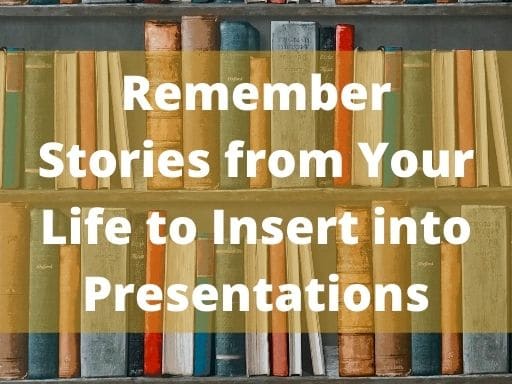
Once you understand the value of inserting stories into your presentation, many people want to know how to do it. So, we also covered a few specific steps in storytelling to make the process easier.
My audience members will often come up to me after a presentation asking, “How do you remember all your stories?” Actually remembering stories from your life is pretty easy. It’s keeping track of all of them and being able to recall the perfect story at the perfect time. That is the hard part. In this post, I’ll give you a few of my secrets. I’ll give you a few simple ways to remember great stories as well as how to recognize when a success will make a great story.
Remember Stories from Your Life (Your Experience) When Put on the Spot
Okay, so we know that stories are fantastic pieces of evidence during the formal presentation. Also, stories are fantastic as answers to tough questions during question and answer sessions. But when we are under a deadline or currently in front of a tough audience, why are stories hard to remember?
Three challenges occur when we are asked a tough question from the audience or we are otherwise put on the spot. First, panic sets in. When we panic, it is very difficult to think clearly. Second, negative self-talk can make us feel even more uncomfortable when already feeling anxious. Finally, and most devastating, we second-guess ourselves constantly during the process.
The Story that You Tell Doesn’t Have to Be Perfect

Even a lame story has more credibility than a mountain of internet research. For a review of this, make sure to read the post about how to persuade your audience.
Last year, I was teaching a class on how to create a persuasive speech with a challenging audience. In the last 20 years as a coach, I’ve been able to pick up on visual queues from the participant when they are struggling. As one of the class members was attempting to use the technique I was teaching, I saw her shake her head. The shake was back ad forth like a person does when saying, “No.” I stopped her immediately. I said, “You just thought of a great story, but you talked yourself out of saying it. What was the story about?” She spent the next minute and a half captivating the group with a funny, self-deprecating story.
After she finished, I said, “You talked yourself out of telling that story. Why?” She replied saying that she thought it might be embarrassing. One of her classmates immediately responded by saying, “What, you didn’t want us to realize you were human?” Everyone chuckled. Just like in this case, most often, our initial response is correct. It is usually the second-guessing that causes us embarrassment.
Your Brain is a Fantastic Hard Drive with Impeccable Recall for Stories. Trust Yourself

This hard drive is flawless, by the way. The problem occurs with the filters. The brain has a tremendous number of filters that keep important things easy to recall. If the brain didn’t have these filters, we’d all be schizophrenic.
The important thing to remember (pun intended) is that whatever you tell your brain will be the truth. For instance, if you tell yourself, “I’m just not a good storyteller,” or “I can never think of good stories,” you will be right.
However, the opposite is true as well. If you tell yourself, “Oh, I have the perfect story for this bullet point!” an image will pop into your mind. That image is a representation of a story from your experience. Let’s try it. Read the sentence below and immediately say, “I have a good story for that.”
I pay attention to deadlines, you will save yourself a lot of frustration.
Just read it and tell yourself that you have a good example of it. You will likely have a memory from your experience pop into your head.
Catalog Great Stories, So that You Don’t Have to Remember Stories from Your Life.

Just before I started The Leader’s Institute ®, I worked for a short time with a leadership coach in Dallas. He was a fantastic coach. He was also a successful consultant. On one occasion, he and I were going to meet with a man who owned an electric company and needed some help. We arrived at the office about 20 minutes early. I opened the car door to get out and my partner said, “Wait, wait… Who have we worked with recently who is in an industry similar to this one?” I had to think about it for a second. I came up with a couple right away. He came up with about six more.
It didn’t hit me until half-way through the meeting why he had done this. He wanted to make sure he was moving important information to the front of his brain. He was so smooth pulling out the success story after success story with easy. I was impressed, and I learned a valuable lesson. Planning my stories ahead of time make the stories much better and easier to tell.
Use Your Phone Notepad to Catalog Great Stories as Events Happen in Real-Time

“You have some experience in the area, John?” He laughed and said, “A little. I was a homicide detective for 22 years.” He came to me after the event and shook my hand. Apparently, he was 22-0 on convictions as a detective.
(I have no idea how I’m going to use that story in a presentation, but I wrote it down, so I wouldn’t forget it.)
Share Success Stories at Your Team Meetings

So last week, we taught programs for Dupont, Fidelity, Marvel, Ft Sam Houston Army Base, Corus (a company in Canada), a preschool, a military school, a high school in California, and The University of Illinois at Chicago. Who has a great success story to share? (Of course, I will prime the pump with my homicide detective story.)
Sharing these success stories help in several different ways. First, these stories build morale. Many of your team members may not ever get to experience the end-user successes that their hard work creates. Second, no one is going to tell the world about your successes if you don’t. There are a bunch of successful companies out in the world who very few people have ever heard of. It’s because they keep their success stories to themselves.
For additional details, see Speak Persuasively.
Don’t Just Remember Stories from Your Life. Tell Your Stories!
The point is that it isn’t enough to just remember stories from your life. You have to tell them your audiences. Your audience will learn from both your success and your failures. When they do, they don’t have to spend as much time trying to figure out the road to success. Your stories will help them get there faster!

